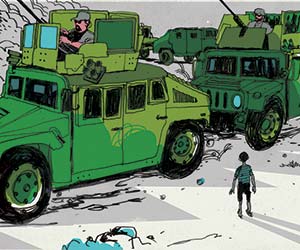One lingering result of Donald Rumsfeld’s reign at the Pentagon is the US military’s increased attention to humanitarian development and aid work that, say critics, puts real-life aid workers at heightened risk of attack and undermines long-term development projects. Rumsfeld’s November 2005 Department of Defense Directive 3000.05 (PDF)—titled “Military Support for Stability, Security, Transition, and Reconstruction (SSTR) Operations”—placed non-combat missions (those aimed at building rule of law and civil society) on equal footing with the Pentagon’s other priorities of killing people and breaking things.
Confusion was inevitable, and now a group of 11 NGOs working in Afghanistan have issued a briefing paper (PDF) to the heads of NATO governments now meeting in Bucharest. The NGOs charge that NATO forces, despite a mutually agreed-to guidelines demarcating the roles of militaries and humanitarians in Afghanistan, have largely ignored the rules.This failure to maintain a proper boundary between war fighting and development work is inherently dangerous, the briefing paper alleges:
There has been an increasing blurring of this distinction, which as at least partly attributable to the conduct of [international military forces]… In contravention of the Guidelines, some military actors engage in relief activities for the purposes of force protection; and certain [International Security Assistance Force] contingents, such as the US and France, are failing to identify themselves as combatants by the continued use of unmarked, white vehicles, which are conventionally used by the UN and aid agencies… the use of heavily protected contractors to implement reconstruction projects [has] also contributed to a blurring of the civil-military distinction. Ultimately, these practices have contributed to a diminution in perceived independence of NGOs, increased risk to aid workers, and reduced areas in which NGOs can safely operate. Currently humanitarian agencies are unable to access over a third of the country, depriving substantial parts of the population of assistance, and underscoring the urgency of greater efforts to preserve the civil-military distinction.













